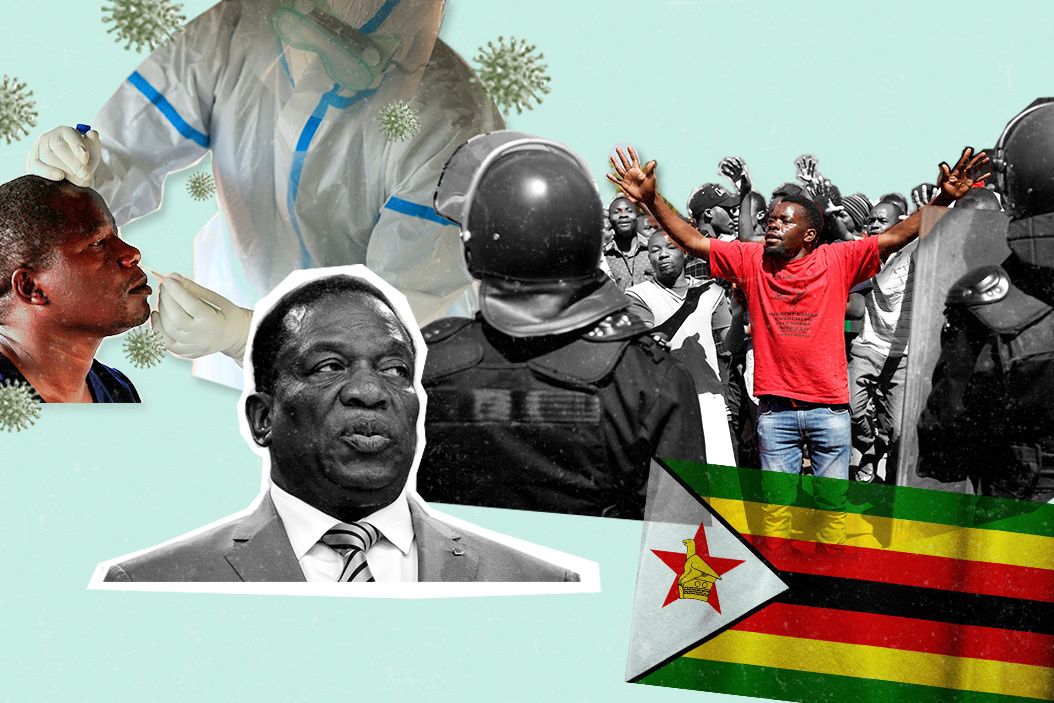August 03, 2020
In late 2017, Zimbabwe's long-serving strongman Robert Mugabe was deposed by the army after 37 years in power. Amid huge popular celebrations, he handed over the reins to Emmerson Mnangagwa, his former spy chief. It was an extraordinary turn of history: Mugabe, one of Africa's last "Big Men" and a hero of the struggle to end white minority rule, went out with barely a whimper, placing Zimbabwe — stricken by economic ruin and international isolation — in the hands of "The Crocodile."
Mugabe has since died, but almost three years after his departure, Zimbabwe's woes continue.
Last Friday, Mnangagwa's security forces swept clean the capital, Harare, ahead of a planned anti-government rally. Mnangagwa warned that anyone involved in what he called an "insurrection" would be dealt with Mugabe-style: rounded up and jailed. The few activists who defied the order ended up behind bars, including prominent local author and Booker Prize nominee Tsitsi Dangarembga.
Here's why protesters in Zimbabwe are fed up these days.
Political repression. Scores of dissidents have been killed by the security forces since Mnangagwa was formally elected in 2018, in a vote which the opposition claims was rigged. Recently arrested journalists and opposition leaders face up to ten years in prison if found guilty of inciting people to participate in public violence.
Corruption. Mugabe's regime was riddled with graft, but things haven't gotten much better since he left. The latest scandal involves a health minister who was caught inflating the cost of pandemic-related medical supplies; he was fired, but the journalist who exposed the scandal was imprisoned.
Inflation. Inflation is running at 737 percent at the moment, as the government prints money to cover expenses. Granted, that's a far cry from the November 2008, when prices rose annually at a world-record 89.7 sextillion percent (that's twenty zeros), but it's still enough to evaporate salaries and pensions.
COVID-19. Zimbabwe's frail health system has collapsed during the coronavirus pandemic. Doctors have sued the government over their lack of access to personal protective equipment, and nurses have gone on strike until they get paid in US dollars. Last week, staff shortages at one of Harare's major hospitals resulted in seven stillborn babies in one night. Instead of hiring more health workers, the government has arrested more than 100,000 people for violating lockdown orders.
Food security. The UN says six in ten Zimbabweans are on the brink of starvation due to the combined effects of severe droughts, economic crisis, and the pandemic. Subsistence farmers, responsible for three quarters of the country's food supply, have produced less than half of Zimbabwe's annual maize requirement this year. Mnangagwa's "response" has been to pay $3.5 billion to white farmers whose land was expropriated and left idle, which dramatically decreased Zimbabwe's once-sizable agricultural output.
As popular anger grows in Zimbabwe, the country's plight offers a sobering lesson: removing a dictator doesn't necessarily make things better — particularly if his system and his cronies remain in power. Will ordinary Zimbabweans, who were too afraid to rise up in large numbers against Mugabe, soon feel they have nothing to lose in standing up to his successor? And will Mnangagwa be able to keep them quiet much longer?
More For You
Bad Bunny during the Super Bowl LX halftime show press conference at Moscone Center.
Kirby Lee-Imagn Images
100 million: The number of people expected to watch the Super Bowl halftime performance with Bad Bunny, the Puerto Rican superstar and newly minted Album of the Year winner at the Grammys.
Most Popular
Think you know what's going on around the world? Here's your chance to prove it.
- YouTube
An imminent US airstrike on iran is not only possible, it's probable.
Americans are moving less — and renting more. Cooling migration and rising vacancy rates, especially across the Sunbelt, have flattened rent growth and given renters new leverage. For many lower-income households, that relief is beginning to show up in discretionary spending. Explore what's changing in US housing by subscribing to Bank of America Institute.
© 2025 GZERO Media. All Rights Reserved | A Eurasia Group media company.
